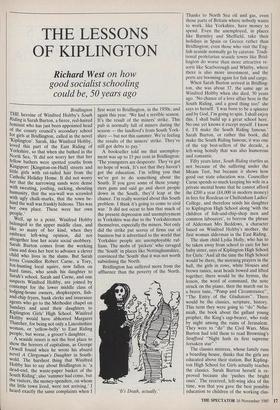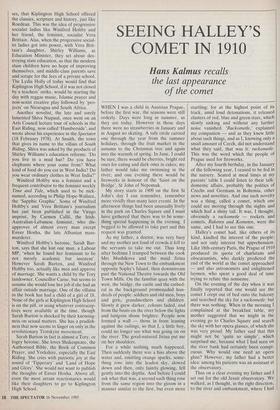THE LESSONS OF KIPLINGTON
Richard West on how
good socialist schooling could be, 50 years ago
Bridlington THE heroine of Winifred Holtby's South Riding is Sarah Burton, a fierce, red-haired feminist who has just been appointed head of the county council's secondary school for girls at Bridlington, called in the novel `Kiplington'. Sarah, like Winifred Holtby, loved this part of the East Riding of Yorkshire, so that when she bathed in the North Sea, 'It did not worry her that her fellow bathers were spotted youths from Kingsport [Kingston-on-Hull] streets and little girls with rat-tailed hair from the Catholic Holiday Home. It did not worry her that the narrowing sands were dense with sweating, jostling, sucking, shouting humanity, that the sea-wall was scrawled with ugly chalk-marks, that the town be- hind the wall was frankly hideous. This was her own place. These were her own people.'
Well, up to a point. Winifred Holtby belonged to the upper middle class, and like so many of her kind, when they embrace left-wing opinion, did not altogether lose her acute social snobbery. Sarah Burton comes from the working class and does her best to advance a clever child who lives in the slums. But Sarah loves Councillor Robert Came, a Tory, fox-hunting local squire, now fallen on hard times, who sends his daughter to Sarah's school. Sarah and Carrie, and one suspects Winifred Holtby, are joined by contempt for the lower middle class of lodging-house owners, shopkeepers, fish- and-chip fryers, bank clerks and insurance agents who go to the Methodist chapel on Sundays and send their daughters to Kiplington Girls' High School. Winifred Holtby would have abhorred Margaret Thatcher, for being not only a Lincolnshire woman, or 'yellow-belly' to East Riding people, but worse, a grocer's daughter. A seaside resort is not the best place to show the horrors of capitalism, as George Orwell found when he wrote his absurd novel A Clergyman's Daughter in South- wold. The harshest thing that Winifred Holtby has to say about Bridlington is: 'a dead-end, the waste-paper basket of the South Riding'; also 'summer had come, but the visitors, the money-spenders, on whom the little town lived, were not arriving.' I heard exactly the same complaints when I first went to Bridlington, in the 1950s; and again this year. 'We had a terrible season. It's the result of the miners' strike. This pub is normally full of miners during the season — the landlord's from South York- shire — but not this summer. We're feeling the results of the miners' strike. They've still got debts to pay.' A bookseller told me that unemploy- ment was up to 15 per cent in Bridlington: `The youngsters are desperate. They've got no hope of work. It's not that they haven't got the education. I'm telling you that we've got to do something about the South. If you gave some of these young- sters guns and said go and shoot people down in the South, they'd leap at the chance. I'm really worried about this South problem. I think it's going to come to civil war.' It did not occur to him that much of the present depression and unemployment in Yorkshire was due to the Yorkshiremen themselves, especially the miners. Not only did the strike put scores of firms out of business but it advertised to the world that Yorkshire people are unemployable ruf- fians. The mobs of 'pickets' who ravaged the 'South' in places like Nottinghamshire, convinced the 'South' that it was not worth subsidising the North.
Bridlington has suffered more from the affluence than the poverty of the North.
`It's Death, actually.' Thanks to North Sea oil and gas, even those parts of Britain where nobody wants to work, like Yorkshire, have money to spend. Even the unemployed, in places like Barnsley and Sheffield, take their holidays in Spain or Greece rather than Bridlington; even those who visit the Eng- lish seaside normally go by caravan. Tradi- tional proletarian seaside towns like Brid- lington do worse than more attractive re- sorts like Scarborough and Whitby, where there is also more investment, and the ports are booming again for fish and cargo.
When Sarah Burton arrived in Bridling- ton, she was about 37, the same age as Winifred Holtby when she died, 50 years ago. 'No chance of a love affair here in the South Riding, and a good thing too!' she says to herself. 'I was born to be a spinster and by God, I'm going to spin. I shall enjoy this. I shall build up a great school here. No one yet knows it except myself. I know it. I'll make the South Riding famous.' Sarah Burton, or rather this book, did make the South Riding famous; it was one of the top best-sellers of the decade, a left-wing homily that was also humorous and romantic.
Fifty years later, South Riding startles us not because of the suffering under the Means Test, but because it shows how good our state education was. Councillor Came spends so much keeping his wife in a private mental home that he cannot afford the £200 a year (£4,000 in modern money) in fees for Roedean or Cheltenham Ladies' College, and therefore sends his daughter to Kiplington High School along 'with the children of fish-and-chip-shop men and common labourers', to borrow the phrase of Alderman Mrs Beddows, a character based on Winifred Holtby's mother, the first woman alderman in the East Riding.
The slum child Lydia Holly, who has to be taken away from school to care for her baby sister, says of Kiplington High School for Girls: 'And all the time the High School would be there, the morning prayers in the hall, the girls in rows, white blouses and brown tunics, neat heads bowed and lifted together; there would be the hymns, the lesson, the word of command, the note struck on the piano, then the march out to a brave tune, "Pomp and Circumstance", "The Entry of the Gladiators". There would be the classics, scripture, history. This term they were going to "do" Nehe- miah, the book about the gallant young prophet, the King's cup-bearer, who rode by night among the ruins of Jerusalem. They were to "do" the Civil Wars. Miss Burton had told them to read Browning's Strafford "Night hath its first supreme forsaken star".'
The classics mistress, whose family runs a boarding house, thinks that the girls are educated above their station. But Kipling- ton High School for Girls actually teaches the classics. Sarah Burton herself is re- proved because she 'pushes the bright ones'. The received, left-wing idea of the time, was that you gave the best possible education to children of the working clas- ses, that Kiplington High School offered the classics, scripture and history, just like Roedean. This was the idea of progressive socialist ladies like Winifred Holtby and her friend, the feminist, socialist Vera Brittain. Alas, when the progressive social- ist ladies got into power, with Vera Brit- tain's daughter, Shirley Williams, as Education Minister, they set about des- troying state education, so that the modern slum children have no hope of improving themselves, and middle-class parents save and scrape for the fees of a private school. The Lydia Holly of today would find that Kiplington High School, if it was not closed by;a teachers' strike, would be starting the day with reggae music, Islamic prayer and non-sexist creative play followed by 'pro- jects' on Nicaragua and South Africa.
Another novelist, the late and sorely lamented Shiva Naipaul, once went on an Arts Council lecture tour of schools in the East Riding, now called 'Humberside', and wrote about his experience in the Spectator (18 February 1978). At Snaith, the town that gives its name to the villain of South Riding, Shiva was asked by the products of Shirley Williams's education reforms: 'Do you live in a mud hut? Do you have elephants where your come from? What kind of food do you eat in West India? Do you wear ordinary clothes in West India?'
Winifred Holtby was a feminist and a frequent contributor to the feminist weekly Time and Tide, which used to be nick- named, according to Philip Hope-Wallace, the 'Sapphic Graphic'. Some of Winifred Holtby's and Vera Brittain's journalism has just been published in the Virago imprint, by Carmen Callil, the Irish- Australian-Lebanese feminist, who dis- approves of almost every man except Enver Hoxha, the late Albanian mass- murderer.
Winifred Holtby's heroine, Sarah Bur- ton, says that she lost one man, a Labour MP, 'when he found her feminism to be not merely academic but insistent'. However Sarah Burton, and Winifred Holtby too, actually like men and approve of marriage. She wants a child by the Tory landowner, Councillor Came, but seems to assume she would lose her job if she had an affair outside marriage. One of the villains in the book has had a child of a girl of 18. None of the girls at Kiplington High School is on the pill, or using whatever contracep- tives were available at the time, though Sarah Burton is shocked by their knowing- ness on sexual matters. She has a prudish- ness that now seems to linger on only in the revolutionary Trotskyist movement.
Sarah Burton in fact is almost a Tory, or fogey heroine. She loves Shakespeare, the Authorised Bible, the Book of Common Prayer, and Yorkshire, especially the East Riding. She cries with patriotic joy at the sound of 'Tipperary' and 'Land of Hope and Glory'. She would not want to publish the thoughts of Enver Hoxha. Above all, even the most arrant reactionaries would like their daughters to go to Kiplington High School.



































































 Previous page
Previous page